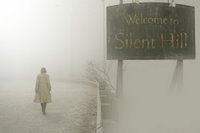 Inside Man (U.S., 2006) * * * 1/2
Inside Man (U.S., 2006) * * * 1/2D: Spike Lee
Spike Lee "sells out" in what is actually one of the best films he's ever made. It's no Malcolm X or Do the Right Thing, but man, is it more focused and tight than Bamboozled. A heist film for adults, many of the critics said; I guess that's because you never really want the heist to end. You want the standoff to go on forever, because the cop (Denzel Washington), his partner (Chiwetel Ejiofor), and the robber (Clive Owen) are so much fun to watch. There's also Willem Dafoe in what's actually an extension of his performance in The Life Aquatic: another light comic role in which he subverts the Dafoe typecasting. The idea is that Owen is holed up in a bank with his fellow crooks and a slew of hostages, and Washington has to figure out why Owen seems too smart to attempt the purported scheme--a demand for a plane--and what the real scheme is. Seriously, I could watch Washington and Owen try to outthink each other forever. And there's such great character humor: Lee clearly loves New York, and wants to show every sort of person who would choose to live in the city post-9/11. In a clever twist, the film reveals that it's really about the nature of profiteering, as Jodie Foster's attorney and Christopher Plummer's banking CEO prove to be more immoral than the thief. Love the Bollywood music that plays during the opening and closing credits, too. How I wish all Hollywood thrillers were this smart.
 Silent Hill (U.S., 2006) * * *
Silent Hill (U.S., 2006) * * *D: Christophe Gans
Yes, I even liked Silent Hill. Got a problem with that? Some people hate this film, and I sort of understand why. For one thing, Roger Avery, who co-authored Pulp Fiction, wrote the screenplay to Silent Hill, and Christophe Gans directed--his previous film was the delightful French genre hybrid Brotherhood of the Wolf (which answered the question: what if James Fenimore Cooper wrote a werewolf film set in Europe?). So expectations were high. For another, some of the dialogue is really bad, and the ending is frustrating and bizarre. But the ending is also original, as is much of the final act, which made me sit forward in my seat and wonder where the hell this new, brash, exciting horror film came from. It was certainly strikingly different from the mostly-bland beginning and middle, which depressingly sticks so close to the video game upon which it's based that the demonic, Clive Barkerish beasties get introduced as though they're the main characters. And much of the early scares aren't scary at all, since the CG is so transparently fake. But the atmosphere--whitish ash floating like snow in an abandoned mining town in an alternate dimension--is mesmerizing, and I love the gimmick of the siren that blares when everything's about to go black (literally--the screen goes black for several seconds, which is effectively chilling) and turn hellish. It just seems goofy that there are such strange, video-gamey clues for the heroine to follow, but I was impressed that the film actually offered an explanation for this and all the other film's gimmicks. The explanation comes in a flashback that looks like it comes straight out of a 70's Satanic exploitation film--it looks like it's been transferred to Super-8 and back again. There's actually a story to this film, and quite a lot of interesting ideas and subtext; the problem for many viewers is that you have to wait until the end to get it all, and I think many weren't paying attention by that point, or had left the theater. In fact, this is a really rare artifact: a good horror film. And twice as rare: it's based on a video game. Imagine how good it could have been if it weren't. A few little revisions to the script and it could have been a classic.
 Strangers with Candy (U.S., 2006) * * 1/2
Strangers with Candy (U.S., 2006) * * 1/2D: Paul Dinello
I used to love the Strangers with Candy TV show, which existed very briefly on Comedy Central around the same time that the mainstream media started taking notice of the show that preceded it, The Daily Show with Jon Stewart. Stephen Colbert was on both, appearing in Strangers as a married science teacher who's having a secret affair with the art teacher "with the mind of a child!" played by Paul Dinello. Both are credited with writing this feature spin-off, alongside the key creative force behind the concept, Amy Sedaris. Sedaris plays Jerri Blank, a middle-aged high school dropout who turned to prostitution and drugs, was thrown into prison, and finally returned home to find her father in a coma. She's told by a doctor (Ian Holm, for some reason) that the only way to help her father is to return to her old life, so she goes back to high school and tries to pick up exactly where she left off. The plot involves a school science fair, and it's all dispensable and padded; the important thing is that the project is a very, very close parody of 70's Afterschool Specials, and dispensing lots of very bad advice along the way. (Blank is a racist, prone to sudden violence, and comes on to everyone of either gender.) It's understandably a one-joke comedy, and the film doesn't really need to exist--the TV show got the job done--but it's still pretty amusing. For all of Sidaris' elastic contorting, the standout of the cast is actually Greg Hollimon, as Principal Onyx Blackman--sit through the ending credits as he gets the last laugh.
 Superman Returns (U.S., 2006) * * *
Superman Returns (U.S., 2006) * * *D: Bryan Singer
Brandon Routh does an amazing impression of Christopher Reeve in this, positioned as the ultimate summer movie, but ultimately drowned by Captain Jack and the Pirates of the Caribbean. The fact that Routh looks and acts so much like the young Reeve of the first, Richard Donner-directed Superman--and that, in choice moments, Kevin Spacey's Lex Luthor is a dead ringer for Gene Hackman's--should tell you everything you need to know about Singer's approach. Singer worships Donner's film, and that's why this film exists. It's like someone from Ain't It Cool News got a chance to direct a Superman movie, so here's Marlon Brando reprising his role as Superman's father (thanks to unused footage from the first film), a scene in which Superman takes Lois Lane (Kate Bosworth) on a romantic night flight, and references a-plenty to just about everything in the prior film. He also pretends that III and IV never happened, and I do sympathize. But because of that slavish devotion to Donner, there's a plasticine quality to the film, and it never really comes to life in the way that Singer's X-Men films did. He's just too reverent, and thus too removed. But there are a few brilliant touches, like the close-up of Lois Lane's feet as she slips off her high heels to board Superman's boots, or the sheer majesty of Superman shooting into the sky to stop a plane set ablaze by a space shuttle's rockets. It makes up for the fact that the actors are just a little too young, that nonsensical Luthor plot and the plodding, unattractive final act.
 X-Men: The Last Stand (U.S., 2006) * * *
X-Men: The Last Stand (U.S., 2006) * * *D: Brett Ratner
The final X-Men installment fell to Ratner, director of the Rush Hour films, when Singer fled to Superman V. That's not as bad as every comic book geek the world-over dreaded. Ratner gets it mostly right, particularly in the film's final shot, which involves supervillain Magneto (Ian McKellan) alone in a park. And I also liked the romantic triangle between teenagers Iceman (Shawn Ashmore), Rogue (Anna Paquin)--who can't touch her boyfriend, or she'd kill him against her will--and cutie Kitty Pryde (Ellen Page), who passes through walls, and who was my crush as a kid, however pen-and-ink. It's true that there's too many characters by this point, and that the whole Dark Phoenix thing isn't nearly as interesting, or as complex, as it should have been. But Hugh Jackman is still the perfect Wolverine, and how sublime that he gets to fight alongside a gymnastic Kelsey Grammer (as Beast) in this one. It's not as self-reverent as Superman Returns, and so it's just a little more fun.

